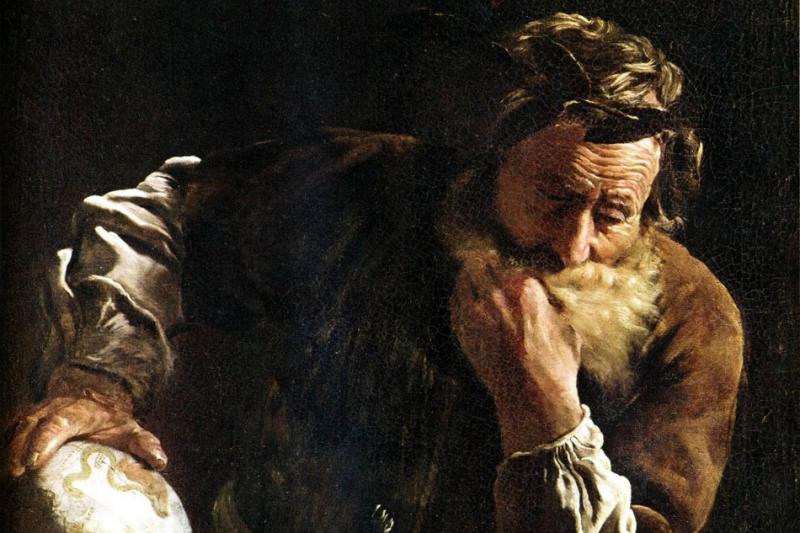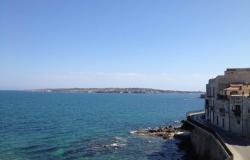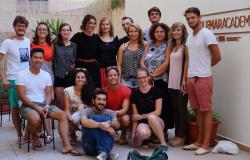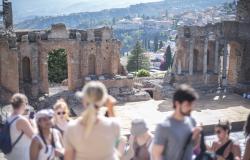Have you heard the one about the Greek boffin who leapt from his bath and ran naked through the streets of antiquity, shouting “Eureka! Eureka!”- “I’ve found it! I’ve found it!”
That was Archimedes, considered by many to be the greatest mathematical mind of the ancient world. But how many people realise that he was Sicilian?
In fact, Archimedes was born 23 centuries ago in Syracuse (Siracusa in Italian) in South East Sicily. He lived in the city for most of his life and died there 75 years later, killed by a Roman centurian. During Archimedes’ lifetime, Syracuse was a Greek city state and at its height was a leading power in Europe. Indeed, it was dubbed “the greatest Greek city and the most beautiful of them all” by Cicero. Today, it is a UNESCO World Heritage Site, with probably the richest history of anywhere in Sicily. Without question Archimedes of Syracuse was Sicilian; had he been alive today he would have been Italian.
Archimedes was a thinker and much of his life was devoted to mathematical thought. Although his mathematical work was not well known in his lifetime, it received wider recognition when copies of his work were circulated centuries later. Jeremy Dummett, in his recent book ‘Syracuse City of Legends’ (I.B.Tauris, 2010), writes about Archimedes’ mathematical work: “It became hugely influential, making Archimedes the founding father of modern mathematics, a position comparable to that of Plato in philosophy.”
This point is further developed in the Encylopaedia Britannica, where it is stated that:
“Archimedes’ mathematical proofs and presentation exhibit great boldness and originality of thought on the one hand and extreme rigour on the other.”
Referring to Archimedes as “the most famous mathematician and inventor of ancient Greece”, the Encyclopaedia Britannica goes on to highlight important discoveries made by Archimedes. These include a device for raising water, known as the Archimedes Screw, which is still used in developing countries today.
In antiquity Archimedes was also known as an outstanding astronomer. His observations were used by Hipparchus, the foremost ancient astronomer; this observational ability and a keen astronomical interest are also revealed in some of the treatises written by Archimedes. For example, the Encyclopaedia Britannica highlights an ingenious procedure that Archimedes used to determine the Sun’s diameter.
Archimedes of Syracuse was also a local hero. During the siege of Syracuse by the Romans in 212BC, he constructed war machines so effective that they long delayed the capture of the city. Armaments designed by Archimedes included cranes which were attached to the masts of warships, capable of hurling missiles and a catapult that could throw weights of 75 kilogrammes. Legend has it that he also used mirrors to deflect the heat of the sun so as to set fire to an attacking fleet of Roman military ships. Stories of Archimedes’ role in the defence of Syracuse have undoubtedly captured the popular imagination down the centuries. The Uffizi in Florence houses 16th century frescoes showing the devices Archimedes used to defend Syracuse from the Romans, including the ‘burning mirror’. And in modern day Syracuse, locals still point to the Castello Eurialo hill on the outskirts of their city as the spot from where Archimedes supposedly set fire to the Roman fleet.
The ‘burning mirror’ story, true or not, still engages the minds of scientific researchers today and recently made headline news within the science community. An article entitled “Archimedes set Roman ships afire with cannons” was recently published in Live Science. In the article Jeremy Hsu, Live Science Senior Writer, discusses new research which negates the tale of mirrors, suggesting instead that Archimedes may have used steam cannons and fiery cannonballs to set fire to the Roman fleet.
Hsu’s article was just one of the outcomes of a recent world conference organised in Syracuse to celebrate the extraordinary achievements and enduring influence of Archimedes. The three day meeting, in June 2010, was co-chaired by professors from the universities of Cassino (Italy) and Patras (Greece), and brought together researchers and academics from the broad disciplines of Mathematics, Engineering, and Science as well as Science historians. Full conference proceedings, available online, are published by Springer under the title “The Genius of Archimedes- 23 Centuries of Influence on Mathematics, Science and Engineering”. The book contains original papers covering a wide range of issues such as:
- Archimedes’ influence on Leonardo da Vinci, Galileo, Newton, and other giants of science and mathematics;
- How stories of eureka moments, naked runs and burning mirrors etc., have influenced us through the ages, whether true or not;
- How the life and works of Archimedes have influenced the teaching of science, mathematics, and engineering.
Clearly Archimedes’ ideas are still relevant to life in the 21st century across the globe. But his legacy is not restricted to the realms of academia.
Fittingly, in his home town, his name has been given to the wonderful Piazza Archimede, situated right in the centre of Ortygia, the ancient nucleus of Syracuse. This square is a bit like a warm and welcoming drawing room, adorned on all sides with the facades of former Catalan-Gothic palazzi. The centrepiece is the burbling Fountain of Diana, depicting Diana the Huntress surrounded by handmaidens, sirens and tritons. Piazza Archimede is the heart and soul of the city.
The Archimedes’ Park Museum (Tecnoparco Archimede Siracusa ) provides the opportunity to get in touch with Syracuse’s most famous son through the inventions that made him famous during his lifetime. The museum has exact reproductions (full-size) of various war machines and other devices created by the genius of Archimedes. Details are available on the Museum Website.
Syracuse was added to the UNESCO list of World Heritage Sites in 2005. The UNESCO selection committee recognised the importance not only of the city’s monuments of exceptional value but equally of its cultural heritage and specifically, the direct links between ancient Syracuse and events and ideas of outstanding universal significance. Archimedes of Syracuse through his life and his works has made an outstanding individual contribution to this universal cultural heritage.











